The Diefenbaker Canada Centre (DCC) is committed to providing high-quality, curriculum-based educational programming, which is delivered to students throughout Saskatchewan each year. These programs are designed to engage youth in important conversations about Canadian history, civic participation and human rights. Through interactive, hands-on activities that incorporate historic case studies and current events, students have an opportunity to explore the fundamental concepts of Canada’s democracy and how they are applicable to everyday life.
Teachers who have participated in DCC programs value them for providing students with a deeper understanding of Canadian political institutions and emphasizing the importance of civic engagement, while meeting curriculum goals and objectives. These dynamic programs inspire and encourage students to take ownership of their rights and responsibilities, while enjoying the benefits of citizenship.
The DCC offers a variety of Instructor-led programs for early and middle years students, both on-campus and in-school.
Primary Years
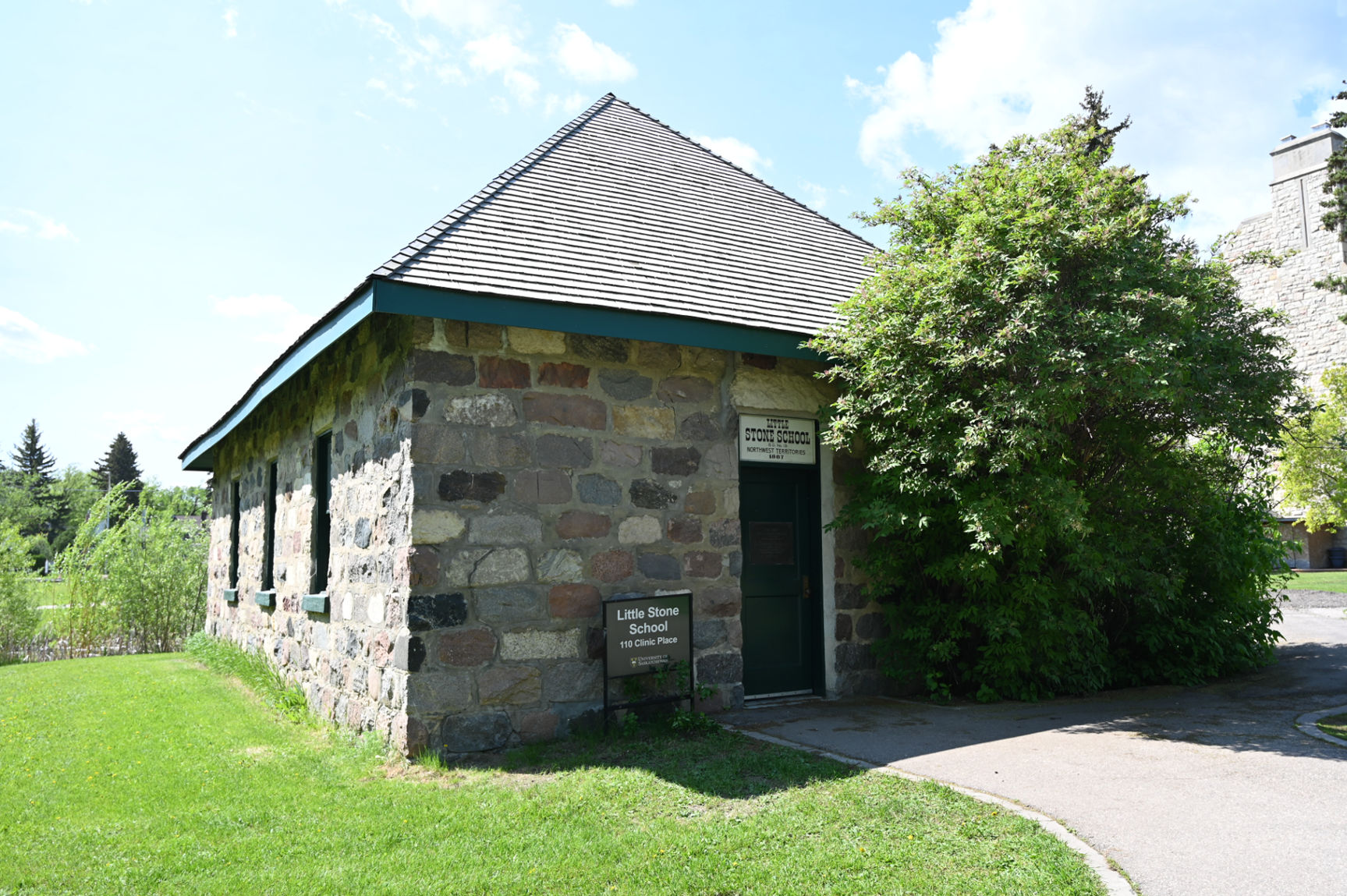
Dates Offered: May through October
Program Length: 1 Hour
Maximum Number of Participants: 30, including chaperones
Cost: $75.00
Come visit and learn about Saskatoon’s first public schoolhouse! The original Victoria School, now known as the Little Stone Schoolhouse (LSS), was built in 1887 by Alexander Marr. The one-room schoolhouse was used until 1905, then dismantled stone by stone and reconstructed on the University of Saskatchewan campus in 1911.
During this interactive program, led by a costumed interpreter, students will learn how school life in the early 1900s differed from present day. The program begins with a historical overview of the Little Stone Schoolhouse (LSS), where students compare and contrast their own classroom with the LSS. Through engaging hands-on activities, students will dress into time-appropriate attire and travel back to 1905 for a short lesson, including an old-fashioned slate boards. Join us to experience what life (and school) was like over a century ago!
Social Studies Curriculum Connections:
Grade 1
DR1.1- Relate family events and stories of the recent or distant past to the student’s place in the present-day family life.
Grade 2
DR2.1- Investigate stories of significant events and persons in the local community’s history to describe the contribution of those who lived in the community in earlier times.
Grade 3
IN3.2- Analyze the cultures and traditions in communities studied.
RW3.3- Evaluate the ways in which technologies have impacted daily life.
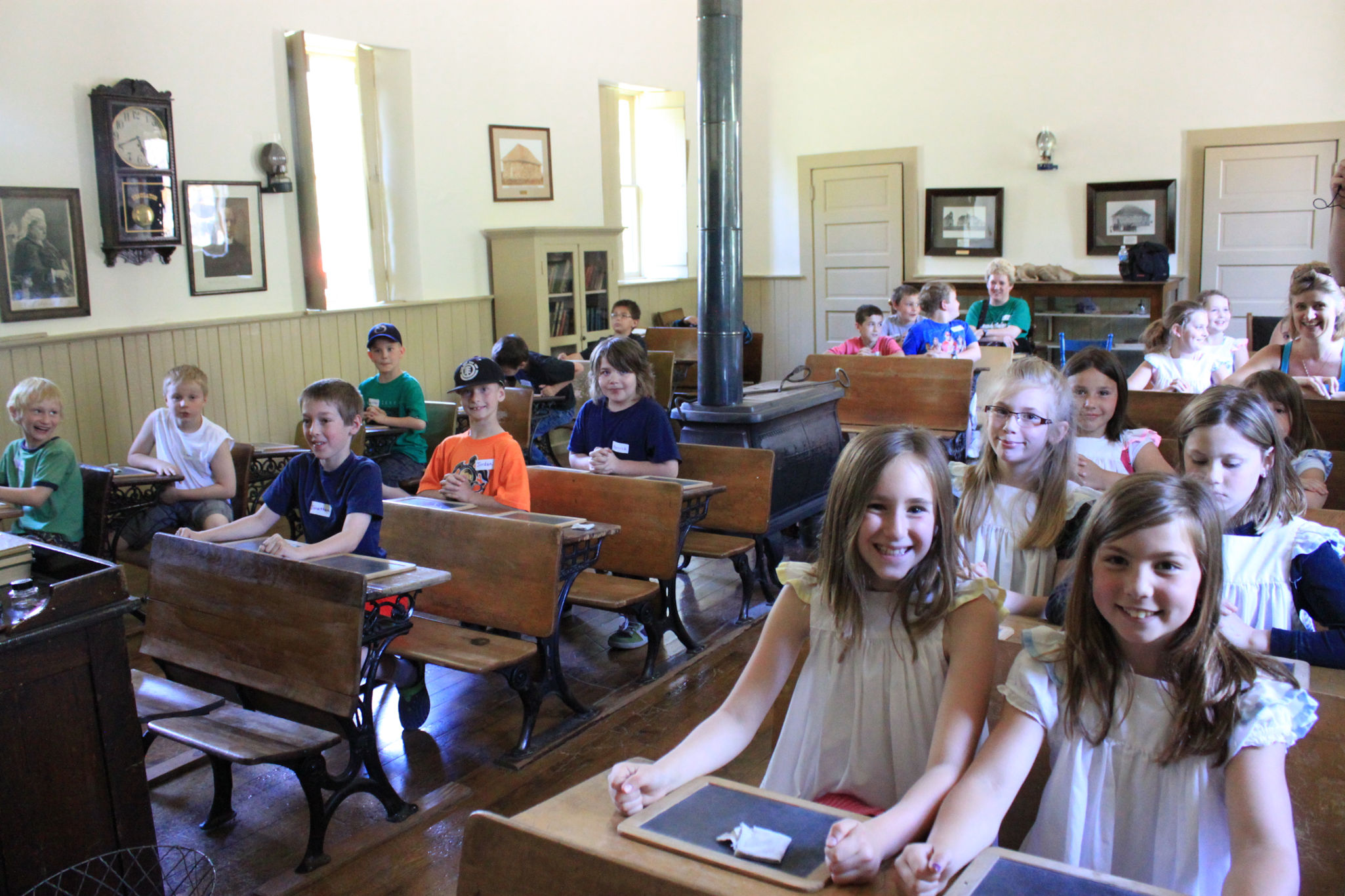
Dates Offered: May through October
Program Length: 2 Hours
Maximum Number of Participants: 30, including chaperones
Cost: $135.00
This program is an extended 2-hour visit to the Little Stone Schoolhouse, which includes the Magic Schoolhouse program and an opportunity to learn about settler life in Saskatchewan. In stark contrast to modern technologies, students will have the opportunity to participate in a variety of timeless games that encourage cooperation and inclusivity.
Inside the schoolhouse, students will try their hand at individual games such as Cup and Ball, Jacob’s Ladder, and The Acrobat. Weather permitting, students will also have the opportunity to compete in a variety of relay races including potato sack races, egg and spoon races, and three-legged races!
Social Studies Curriculum Connections:
Grade 1
DR1.1- Relate family events and stories of the recent or distant past to the student’s place in the present-day family life.
Grade 2
DR2.1- Investigate stories of significant events and persons in the local community’s history to describe the contribution of those who lived in the community in earlier times.
Grade 3
IN3.2- Analyze the cultures and traditions in communities studied.
RW3.3- Evaluate the ways in which technologies have impacted daily life.
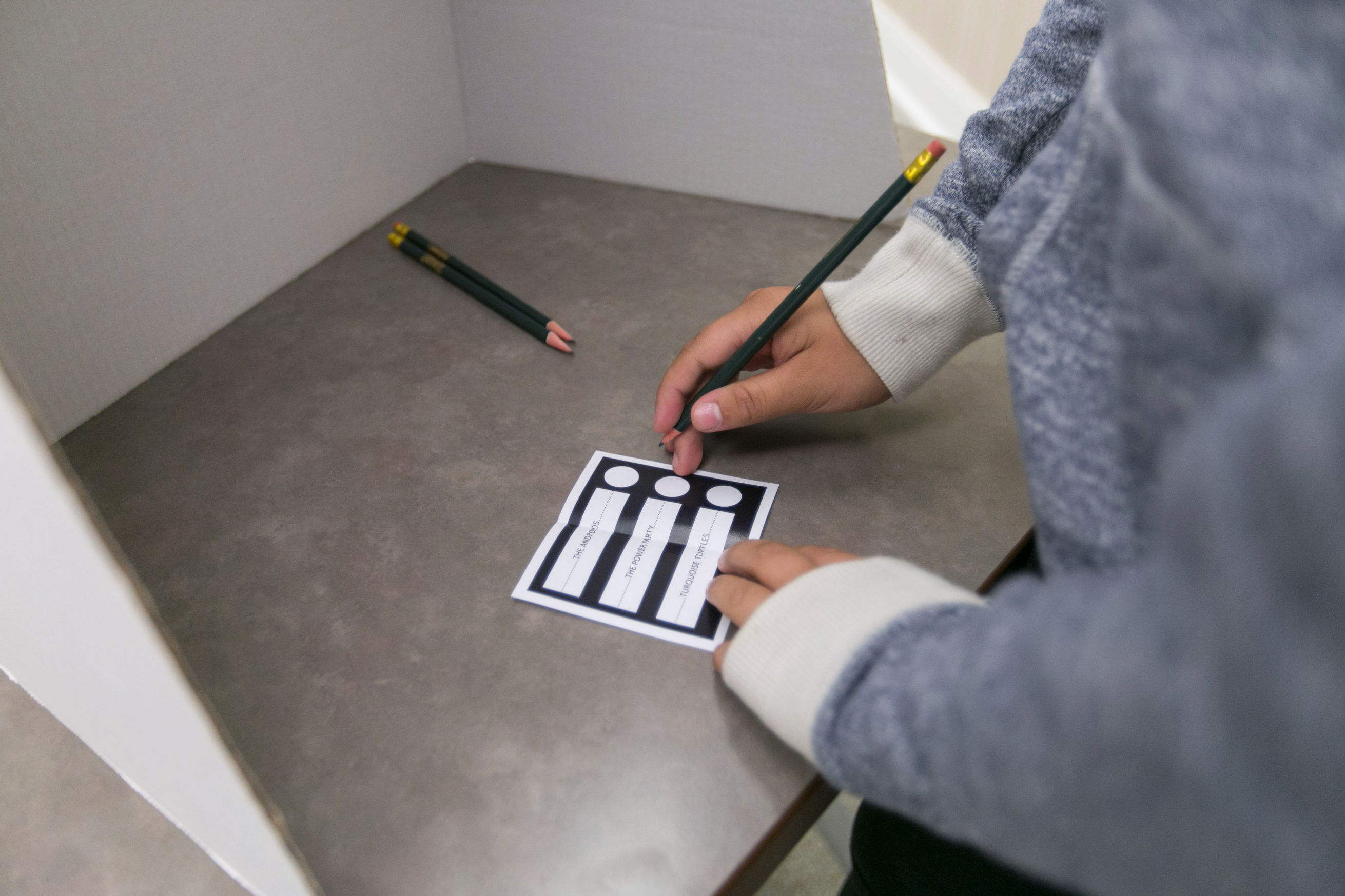
Dates Offered: September through June
Program Length: 1 Hour
Maximum Number of Participants: 30, including chaperones
Cost: $75.00
This program provides an engaging introduction to the basic principles of Canada’s democracy, laying the foundation for future civic participation. Students will learn about leadership and the election process through a variety of hands-on activities, including the development and promotion of a political platform and the presentation of political campaign speeches. A simulated election will give each student an opportunity to visit the classroom polling station and vote for their favourite political party using a secret ballot system.
Social Studies Curriculum Connections:
Grade 2
PA2.1 – Analyze how decisions are made within the local community.
Grade 3
PA3.1 – Compare how decisions are made in the local community and communities studied.
PA3.2 – Demonstrate awareness that divergent viewpoints may lead to conflict as part of group interactions, and assess various means of conflict resolution.
Middle Years
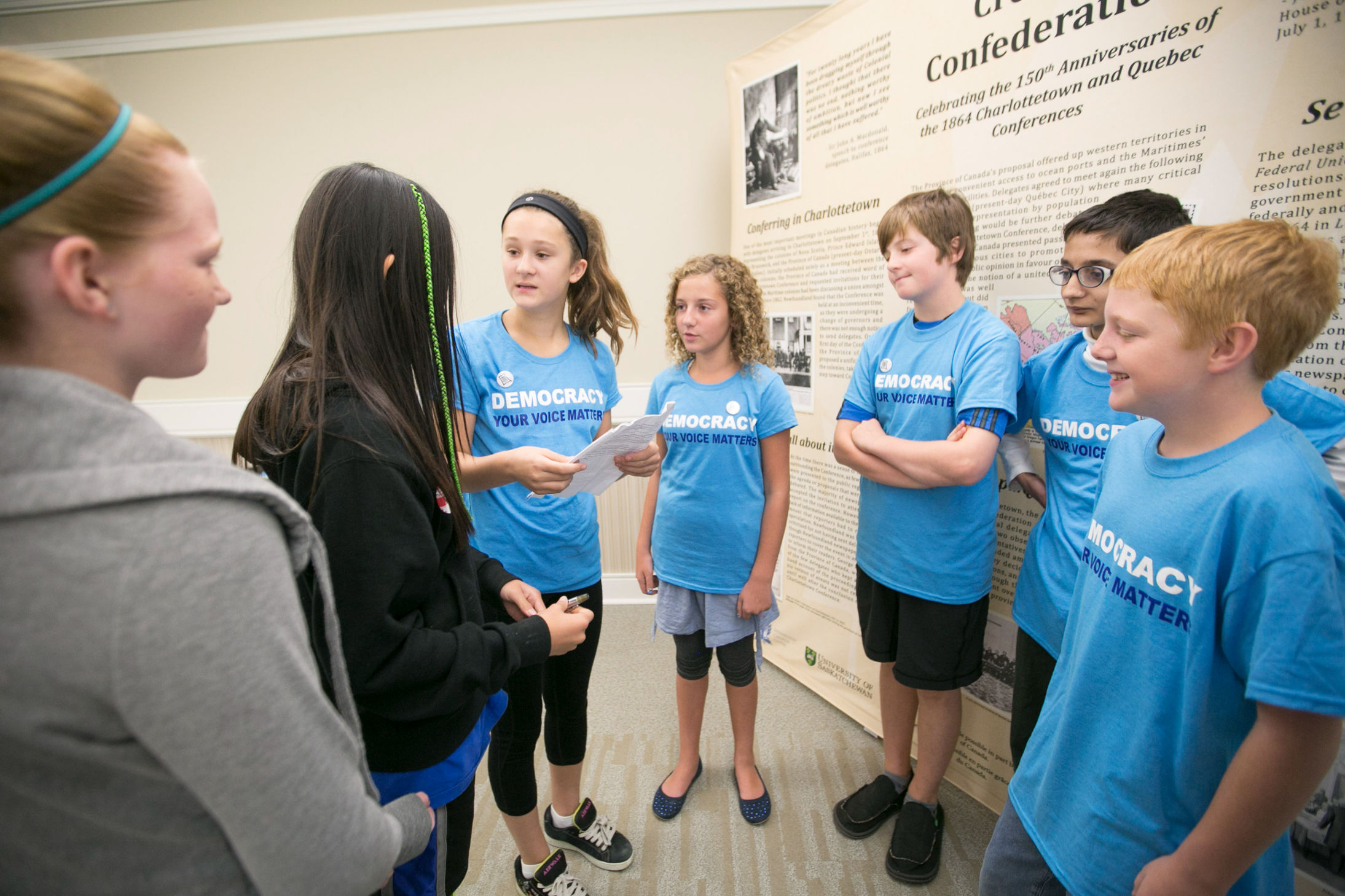
Locations: Diefenbaker Canada Centre or In-School Program
Dates Offered: September through June
Program Length: Half Day (2 hours) or Full Day (4 hours)
Maximum Number of Participants: 30, including chaperones
Cost: The YVM program is made available for FREE to classrooms thanks to the generous support of Elections Saskatchewan.
The full YVM program consists of 5 1-hour learning modules. Typical half and full-day programs are described below, however, educators can combine any modules to create a customized program based on their learning objectives.
Half Day Program: 2 hours (Gr. 4 – 6)
Module 1: Raise Your Voices
Students will explore the principles and terminologies associated with elections, examine the electoral process, and key events in Saskatchewan’s political history, and review the history of the vote in Saskatchewan. Students will then form groups to create political parties and select key issues. The module concludes with the students presenting their platform speeches and a lively election simulation.
Module 2: Your Province, Your Power
Students will examine the structure of Saskatchewan’s Provincial government; discuss the process by which a bill becomes law and the individual roles of Members of the Legislative Assembly; Students will create their own bill and participate in a provincial legislation simulation.
Full Day Program: 4 hours (Gr. 7-8)
Program includes Modules 1 and 2 above, and two of the following:
Module 3: Reasoning out Responsibility
In this module, students will discuss federalism, including the historical reasons and contemporary implications of the delegation of powers between the federal and provincial governments. Utilizing a Supreme Court case study, students will debate jurisdiction.
Module 4: Get Involved
This module highlights the importance of informed citizenship, and that individuals can influence policy changes which affect their everyday lives. Students will discuss various organizations, including political parties, service clubs, non-governmental organizations (NGOs), non-profits, etc., and the importance of participation in these groups.
Module 5 Becoming Canadian (Optional)
This module highlights the history of Indigenous peoples and stresses the importance of treaty relationships and reconciliation. It also explores Canadian and Saskatchewan immigration, outlining the citizenship process and discusses the rights and responsibilities of citizenship.
Social Studies Curriculum Connections
Grade 4
IN4.1 Analyze how First Nations and Métis people have shaped and continue to shape Saskatchewan.
DR4.2 Explain the relationship of First Nations and Métis people with the land.
DR4.3 Analyze the implications of the Treaty relationship in Saskatchewan.
PA4.1 Analyze the relationship between governance institutions in Saskatchewan and the quality of life of people in the province.
PA4.2 Demonstrate an understanding of the provincial system of government.
PA4.3 Demonstrate an understanding of the First Nations system of governance.
PA4.4 Demonstrate an understanding of the Métis governance system.
Grade 5
PA5.1 Describe Canada’s political evolution.
PA5.2 Explain the purposes and functions of governance structures in Canada, including First Nations systems and those patterned on the Westminster parliamentary system.
Grade 6
PA6.1 Examine the relationship between an individual’s power and authority and the power and authority of others.
PA6.3 Explore examples and explain how people, such as ethnic minority groups, the disabled, youth, and the elderly, may be affected by injustice or abuses of power.
Grade 7
PA7.2 Investigate the structures and processes of democratic government in Canada.
Grade 8
PA8.1 Contemplate the implications of Canadian citizenship on the life of Canadians.
PA8.4 Assess the impact of citizens’ willingness and ability to actively engage in Canadian political processes.
DR8.3 Assess how historical events in Canada have affected the present Canadian identity.
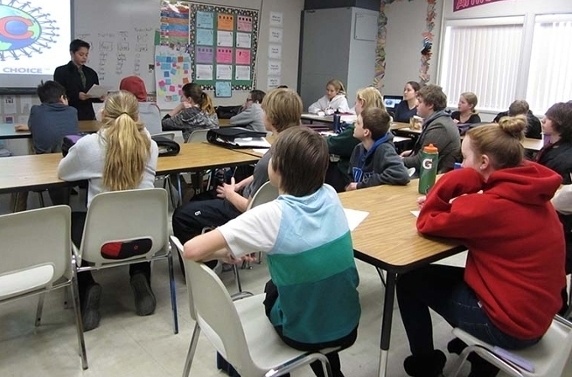
Dates Offered: September through June
Program Length: One Module (1 hour), Half Day (2 hours), or Full Day (5 hours)
Maximum Number of Participants: 30, including chaperones
Cost: One Module $75.00, Half Day $135.00, Full Day $250.00
Democratic engagement is often linked to civic education. This interactive program demonstrates the relevance of Canada’s democratic and parliamentary institutions through an examination of Canada’s political system, why voting matters and how historic and current human rights issues have shaped our country. Divided into sessions, students will focus on the key themes of democracy, citizenship, rights and freedoms, establishing a foundation for informed citizenship.
Democracy to Active Citizenship is composed of four one-hour sessions, described below. Educators can combine any sessions to create a customized program based on their learning objectives. Both half day and full-day programs are available.
Half-Day Program: 2 hours (Gr. 4 – 6)
Full-Day Program: 4 hours (Gr. 7-8)
Freedom of Expression Through examples in history and in today’s media, students will discuss the importance of freedom of speech and freedom of the press in their daily lives. Using political cartoons as a launching point, they will explore how freedom of expression is viewed around the world. Students will also analyze and discuss issues surrounding participation in a democracy.
Fight for Freedom Students will examine the origins of and learn about their rights as Canadian citizens, and how rights legislation is viewed in a global context. Using documents including The Canadian Charter of Rights and Freedoms and The Universal Declaration on Human Rights students will build a case for release in an immersive simulation involving the denial of human rights.
Make Your Mark Students will explore the principles and terminology associated with elections. They will also examine election processes and discover the history of the vote, including campaigning and the fundamentals of a democracy. Students will further engage with the democratic process by participating in an election simulation.
Democracy Now! This session will provide students with a complete and holistic view of Canada’s democracy. Various levels of Canada’s political bodies will be explored – such as the lower and upper houses, the court system, the role of Cabinet and the Crown. Students will also discuss the importance of active citizenship.
Social Studies Curriculum Connections
Grade 4
IN4.1 Analyze how First Nations and Métis people have shaped and continue to shape Saskatchewan.
DR4.2 Explain the relationship of First Nations and Métis people with the land.
DR4.3 Analyze the implications of the Treaty relationship in Saskatchewan.
PA4.1 Analyze the relationship between governance institutions in Saskatchewan and the quality of life of people in the province.
PA4.2 Demonstrate an understanding of the provincial system of government.
PA4.3 Demonstrate an understanding of the First Nations system of governance.
PA4.4 Demonstrate an understanding of the Métis governance system.
Grade 5
PA5.1 Describe Canada’s political evolution.
PA5.2 Explain the purposes and functions of governance structures in Canada, including First Nations systems and those patterned on the Westminster parliamentary system.
Grade 6
PA6.1 Examine the relationship between an individual’s power and authority and the power and authority of others.
PA6.3 Explore examples and explain how people, such as ethnic minority groups, the disabled, youth, and the elderly, may be affected by injustice or abuses of power.
Grade 7
PA7.2 Investigate the structures and processes of democratic government in Canada.
Grade 8
PA8.1 Contemplate the implications of Canadian citizenship on the life of Canadians.
PA8.4 Assess the impact of citizens’ willingness and ability to actively engage in Canadian political processes.
DR8.3 Assess how historical events in Canada have affected the present Canadian identity.
High School
Dates Offered: September through June
Program Length: One Module (1 hour), Half Day (2 hours), or Full Day (5 hours)
Maximum Number of Participants: 30, including chaperones
Cost: One Module $75.00, Half Day $135.00, Full Day $250.00
Engaged Citizenship: Exploring Pathways to Leadership is a new, curriculum based resource designed to provide classrooms with valuable information, engaging activities and career resources to facilitate in-person.
Through a series of four modules, students will explore the structure and function of provincial and territorial governments, take an in-depth look at the role of lieutenant governor and territorial commissioner, and consider their own pathway to leadership, as they learn about public policy development and informed, active citizenship.
Module One: Provincial and Territorial Government explores the history and structure of provincial and territorial governments across Canada. Short research challenges and discussion opportunities will establish a better understanding of regional variation and unique differences in legislation. Through interactive classroom simulations, students will learn how legislation is proposed, debated and passed. They will be challenged to create their own bill based on current issues, and will attempt to pass it into law through the classroom assembly.
Module Two: Lieutenant Governors and Territorial Commissioners showcases these unique positions through an historic overview of the roles, and their responsibilities within the legislative assembly. Following the themes of personal and professional growth, and cultural and social activism, the next generation will be inspired through the stories of leadership and personal accomplishments demonstrated by these outstanding Canadians. An historic timeline from each province and territory will also demonstrate how the position has recently evolved to become more inclusive and reflective of Canada’s diversity. A specialized project will allow students to explore the qualities of leadership and engaged citizenship and what these concepts mean in governance.
Module Three: Public Policy in Canada will provide students with an in-depth look at the process of policy development as it relates to regional, national and international issues. Students will establish a better understanding of Canada’s role in the international community by comparing public policies throughout the world. Through individual public policy projects, students will research, develop and propose policies related to real-world issues. Through classroom debate designed to simulate government policy development, students will use their knowledge and passion to develop effective strategies to solve current issues while evaluating real-world implications.
Module Four: Civic Engagement takes an in-depth look at civic engagement. Beginning with a review of the democratic process, students will discover opportunities for leadership, and the importance of becoming an active, informed participant. Through short lessons, a voting simulation and activities related to political cartoons, memes and fake news, students will establish an understanding of the electoral process while developing the skills needed to navigate the world of misinformation, partisanship and personal bias.
Guided Tours
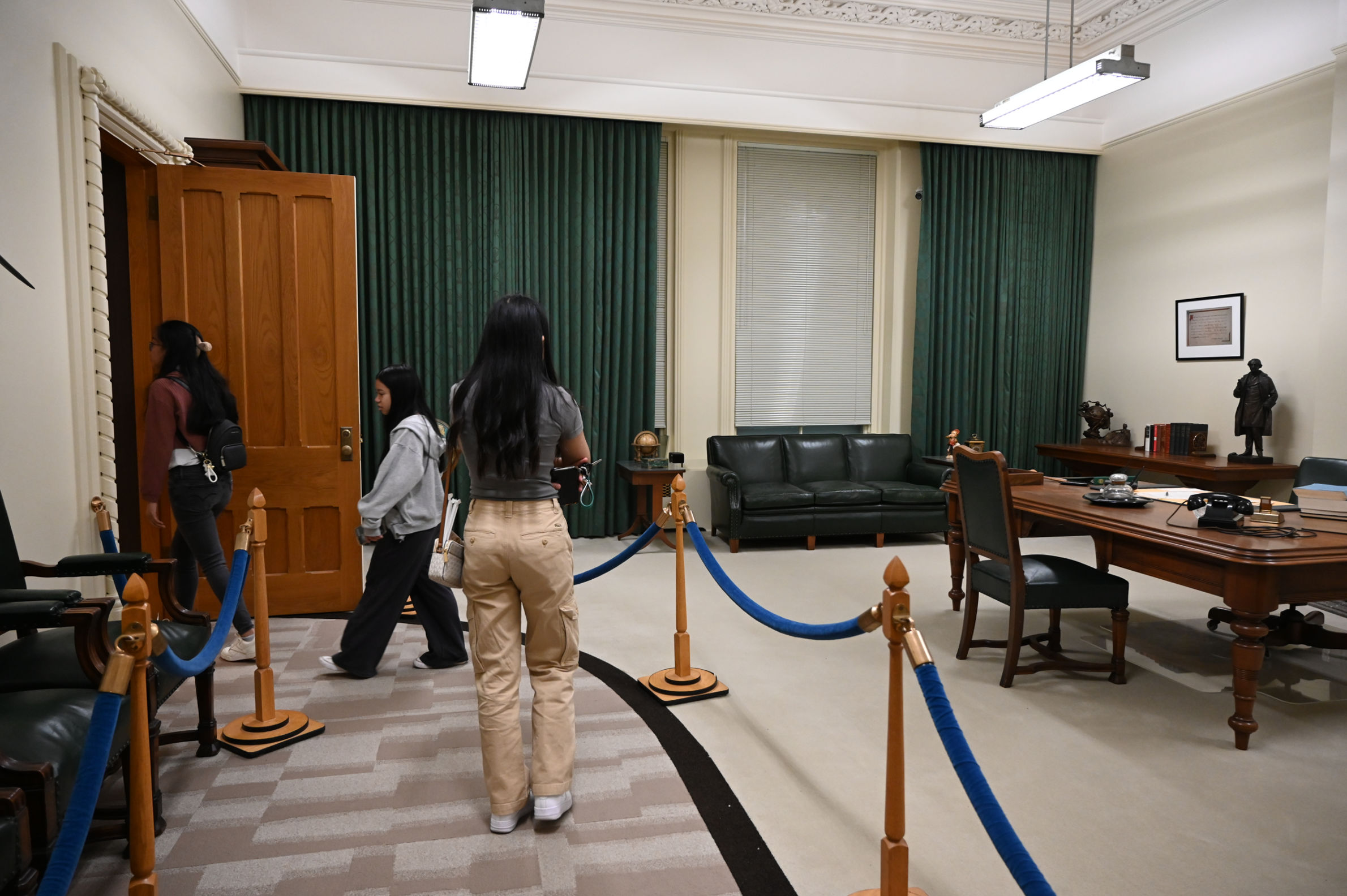
Dates Offered: Year-round
Program Length: 30, 60 or 90 minutes
Suggested Grade Level: 5-12
Maximum Number of Participants: 30, including chaperones (10:1 ratio)
Cost: 30 min $60.00, 60 min $75.00, 90 min $90.00
30 Minute Gallery Tour (choose one):
One Canada Tour: This tour will provide a brief chronological review of the life, career, and legacy of John G. Diefenbaker discussing the various ways his mark was left on Canada.
Temporary Exhibit Tour: Brief tour of the current temporary gallery exhibit.
60 Minute Gallery Tour (choose one):
One Canada Tour: This tour combs through the life, career, and legacy of John G. Diefenbaker in-depth. An analysis of Diefenbaker’s notable accomplishments as Prime Minister contested relationship with US leadership, and an overview of the Avro Arrow cancellation will be discussed. The tour will conclude with a walk-through of two replica rooms: Prime Minister’s Office, 1957-1963; and the Privy Council Chamber, 1957-1963.
Temporary Exhibit Tour: Detailed tour of the current temporary gallery exhibit.
90 Minute Gallery Tour:
This tour encompasses the highlights of both the One Canada Tour and Temporary Exhibit. The first half of the gallery tour will review Diefenbaker’s life, career, and legacy in-depth. Highlights include Diefenbaker’s accomplishments as Prime Minister and a walk-through of two historically-accurate replica rooms: Prime Minister’s Office, 1957-1963; Privy Council Chamber, 1957-1963.
The second half of the gallery tour will focus on the current travelling exhibit.
Social Studies Curriculum Outcomes:
Grade 5
PA5.1 Describe Canada’s political evolution.
IN5.2 Analyze the evolution of Canada as a multicultural nation.
Grade 6
PA6.1 - Examine the relationship between an individual’s power and authority and the power and authority of others.
PA6.3 - Explore examples and explain how people, such as ethnic minority groups, the disabled, youth, and the elderly, may be affected by injustice or abuses of power.
DR6.4 - Relate contemporary issues to their historical origins in Canada and a selection of countries bordering the Atlantic Ocean.
Grade 7
IN7.2 - Examine the effects of globalization on the lives of people in Canada and in circumpolar and Pacific Rim countries.
Grade 8
PA8.1 - Contemplate the implications of Canadian citizenship on the life of Canadians.
DR8.3 - Assess how historical events in Canada have affected the present Canadian identity.
IN 8.1 - Investigate the meaning of culture and the origins of Canadian cultural diversity.
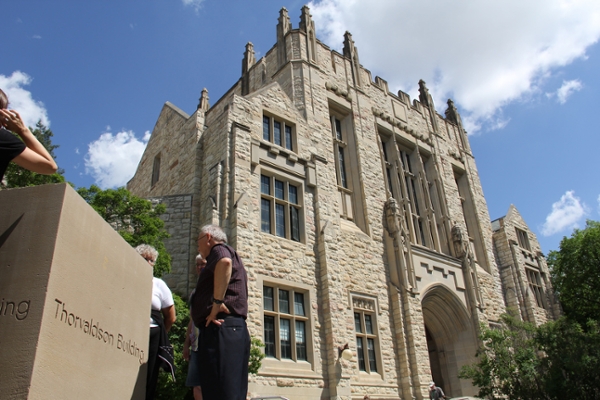
Dates Offered: Year-round
Program Length: 30, 60 or 90 minutes
Suggested Grade Level: 5-12; Community Groups, Individuals and Families Welcome
Maximum Number of Participants: 30, including chaperones (10:1 ratio)
Cost: 30 min $60.00, 60 min $75.00, 90 min $90.00
Historical walking tours are available throughout the year for school and community groups as well as individuals and families. Depending on the length chosen, this walking tour will highlight the university’s history, important achievements, and unique architecture. Stops along the tour include the Airplane Room, Natural Sciences Museum, the Peter McKinnon Building, the Museum of Antiquities, Voyageur Place, and the Gordon Oakes Red Bear Student Centre.
Social Studies Curriculum Outcomes:
Grade 6
IN6.1 - Evaluate and represent personal beliefs and values by determining how culture and place influence them.
Grade 8
DR8.3 - Assess how historical events in Canada have affected the present Canadian identity.
Physical Education Curriculum Outcomes:
Grade 5
PE5.10 - Examine and critically assess personal positioning within the five levels of a social skills continuum for participation in movement activities (i.e., irresponsible behaviour, self-control, involvement).
Grade 6
PE6.14 - Apply personally developed plan for progressing through the five levels of a social skills continuum that begins with irresponsible behaviour and progresses through self-control, involvement, self-responsibility, and caring for others to support personal growth in making positive connections to others, while participating in movement activities.
Grade 7
PE7.13 - Role model and practise the behaviours associated with demonstrating responsibility and caring for others to support personal growth in making positive connections while participating in movement activities.
Grade 8
PE8.14 - Analyze the influences of past and present social, cultural, and environmental perspectives on the need for recent physical movement initiatives (e.g., in motion, ParticipAction, Indigenous Games, walking paths) that support personal, family, and community active living and well-being.
Stay Tuned
More tours are available throughout the year for school and community groups as well as individuals and families.
Guidelines
On-campus programs take place at the Diefenbaker Canada Centre or the Little Stone Schoolhouse and must adhere to the following guidelines:
- Large groups or multiple classes will be divided into groups of no more than 30 individuals (including chaperones). Teacher and parent supervision is encouraged to help students get the most out of the experience.
- Transportation is the responsibility of the school or group.
- Paid-metre parking is available at the DCC.
- The DCC is a public facility; therefore, student groups may share the gallery space with other visitors.
- DCC staff and instructors make every effort to ensure that all visitors have an enjoyable experience.
